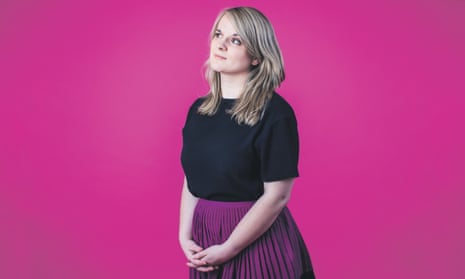At the beginning of this year, I became one of the many women who have published their money diaries on the internet. I was asked by my editor to record my spending for four weeks over Christmas, to test my assumption that I would not be able to afford to buy a house in London by simply cutting back on day-to-day extravagances such as takeaway coffees. On learning my salary, the personal finance expert Martin Lewis agreed that this was the case; when he saw a day-by-day breakdown of where my money was going, he changed his tune.
Lewis told me that I could save enough for a deposit – yes, in London; yes, by myself. But first I would have to rein in my senseless spending. I concluded the story a bit shamefaced by his gentle admonishment and resolved to do better. Then my diary was published.
The response was immediate and visceral; I have never experienced anything like it. In a very long, typewritten letter, a reader told me my fecklessness brought shame on my parents and my editor and warned that, if not addressed, it would cause tension with my future husband and our hypothetical children, culminating, potentially, in my alcoholism. “I have not written this in anger,” she concluded, “but out of serious concern for the way you are wasting your money and your life.”
Some people saw their spending reflected in mine, they told me privately. Many more were publicly critical of my £181 haircut (too much), my £1 sausage roll (way too little), and for losing a £20 note on a night out (which I wasn’t thrilled about either). It was later raised in a keynote address on financial education at the University of Edinburgh beneath the heading: “Entitled, spoilt and ridiculous or just youthful play?”
Would I have shared so freely had I known what was to come? Maybe not. I had no idea that my personal finance could be taken so personally by so many people. In that regard, I was colossally naive.
Money diaries are reliably incendiary on social media – hence their popularity. The Telegraph, the Guardian, Ireland’s TheJournal.ie, Man Repeller and many others regularly publish them, but the site most responsible for popularising them is Refinery29. The lifestyle site now publishes anonymous diaries daily in the US and weekly in the UK, overwhelmingly written by and read by women.
Lindsey Stanberry, Refinery29’s work and money director and the editor of the series, says its aim is to give women a space in which to share their experiences and knowledge of personal finance when the social stigma against it perpetuates their financial disadvantage.
“Money is still taboo,” she says. “One of the reasons that the wage gap has lingered so long is because women have always been discouraged from talking about it, therefore we lack basic knowledge. Having these conversations isn’t easy, but there’s literal payoff.”

It is not just the case that women are systematically paid less than men: they are also less likely to ask for a raise or to invest their savings, and are at greater risk of being impoverished by separation or divorce. The Billfold – another US site aimed at women and set on breaking “one of the last taboos in our culture: talking about what you earn” – powerfully set out the stakes in A Story of a Fuck Off Fund, published in January 2016, showing how having savings put away can be the difference between having no choice but to stay in an abusive workplace or relationship and being free to leave.
With more to gain from free and frank discussion of personal finance, it is not surprising that women write the majority of money diaries. The catch is, for as long as the taboo exists, they may suffer a personal cost for doing so – especially when a diary goes viral. One published in Grazia last month, about a woman earning £40,000 a year and still receiving cash from her parents, received widespread coverage beneath headlines such as “BANK OF DAD: Woman, 30, slammed as a sponger”, alongside choice quotes of critical online reaction.
It is not only diarists deemed by the internet to be irresponsible with money who go viral. Last month, a 22-year-old woman earning $25,000 (£19,700) a month from e-commerce was held up as “your brunch hate read of the day” and “cluelessly braggy” for saving the majority of her earnings each month. Refinery29 also came under fire for showcasing such a wealthy woman, although its own analysis had previously found that while readers request diaries of women with lower salaries, those featuring higher salaries get more clicks.
“You have to be a near-perfect human” to escape criticism of your money diary, Stanberry wrote in her address to “all the haters”: “When are women allowed to celebrate their wealth? Is it sexist the way we criticise women for their spending habits? Or when they accept help from family?”
In my case, some readers were angry that I was put forward to answer the question: “Can one millennial afford to buy a house?” when I was not representative of my generation, earning considerably more than the median annual salary of £28,677 (although my salary is about in line for London).
Regardless of the outcome, they said, the exercise fuelled false narratives that home ownership was purely a question of personal restraint in the same way that those “success stories” profiling young homeowners always play down the deposit gifted by their parents.
Which is fair enough. Indeed, nearly a year on, I am more sceptical of Lewis’s final assessment that I could afford a house in London on my own. I had begun the diary exercise knowing that I was not prepared to make home ownership the primary goal of the rest of my 20s and much of my 30s. Nothing Lewis said changed that.
Many more readers, however, took umbrage with the cost of my haircut separate to any question of its alleged link to the housing crisis, despite it being one of only two I had all year, and costing far less than, say, a football season ticket or a new iPhone – both purchases that would be wasted on me, which others find to be worth every penny.
“Life is just more expensive for women,” says my friend Katie, 29. “We can’t wear the same cheap T-shirt and pair of jeans every day for five years and still be treated with respect.” As the self-described “nosiest person in the world about money”, she is a voracious reader of online money diaries, and has published her own, anonymously.
Katie lists, with exasperation, clothes, makeup, skincare and beauty treatments – all to some extent necessary for women to be judged equally presentable and competent as a man. Being transparent about those costs makes painfully clear the double standard, she says. “It is a political act to talk openly about money and everyone should do it and be challenged to do it.”
Katie is Australian. In hindsight, I connect the breeziness with which I approached publishing my finances to the fact that I spent more than half my life living there and in New Zealand, where there is less of a social stigma against talking about money than there is in the UK. My female friends and I have regular, frank conversations about our own spending, saving and earning, going back years to the starts of our careers, on the understanding that the knowledge empowers us all.
With many of them having successfully negotiated salary increases, it has even brought material benefit. But it is testament to our complex, personal relationship with personal finance that even people who are in favour of transparency, in principle, can find themselves going “all cannibalistic” when faced with it, says Devin Friedman, the editor of the online Wealthsimple Magazine, based in Toronto, Canada.
Its Money Diaries series made waves online in the US last month with an American couple’s anonymous, personal account of how they came to be an estimated $360,000 in debt. “A lot of people were really angry about it,” says Friedman. “Like: ‘You’re sending your kids to private school, you’re buying sushi, and you’re complaining that you’re in debt?’” The couple declined to be interviewed for this piece.

Friedman points to studies (such as this one) that show money only makes people happier if it improves their social rank to emphasise that it is not a strictly logical matter. “Money has bundled into it such emotional power: resentment, inadequacy, fear, the desire to impress. Sometimes reading about people with privilege acting like they’re not privileged can inspire people to get pissed off.”
But everyone is better off understanding money better, Friedman says, whether on a practical level or a human one. “It’s anecdotal evidence, but I think women have made more of a point of being transparent than men have. For men, the social imperative isn’t there.” Friedman says the comedian Maria Bamford and the co-creator of Crazy Ex-Girlfriend, Rachel Bloom, felt it was important to give specifics about their income in their interviews for Wealthsimple.
So, in the spirit of gender equality, nearly a year since my money diary was published, am I any closer to home ownership?
Absolutely – in the same way that if I take a step south-east, I am closer to Australia. But Lewis’s (very obvious) points that I would need savings sometime, and that I would have more the sooner I started, made a strong impression on me. In 11 months, I have saved six weeks’ salary without going into debt – or even cutting down on coffee. The tradeoff has been bringing in my lunch for four weekdays out of five. I hardly notice the difference.
I also use Monzo, the millennial-friendly bank, to keep track of my discretionary income, and the savings app Chip. But really, as Lewis said, the biggest shift I had to make was mental. Once I was convinced of the need to save each month, my spending seemed to contract to accommodate it.
The fact that I was able to achieve this without significant impact on my lifestyle is more evidence of what was obvious, first to Lewis, then to my irate correspondents: clearly, I had money to burn. I just had to keep a spending diary to realise it myself. I would recommend the exercise, for anyone lucky enough to be merrily oblivious about where their money is going – but maybe not publishing it on the internet. At least, not beneath your name and your email address.
